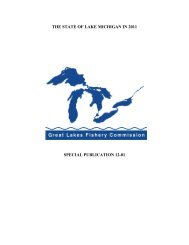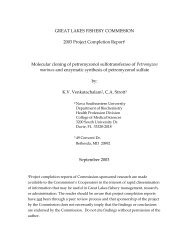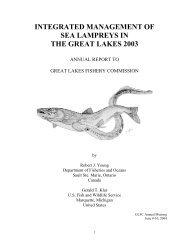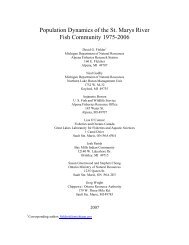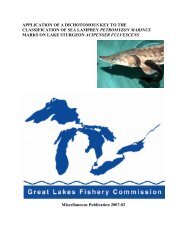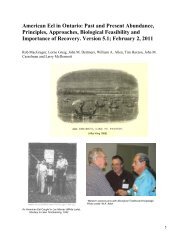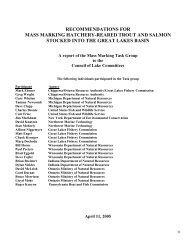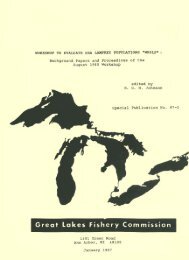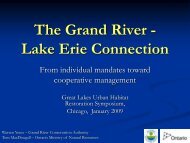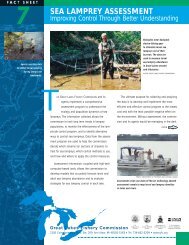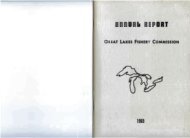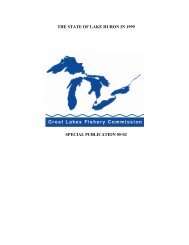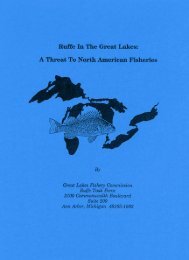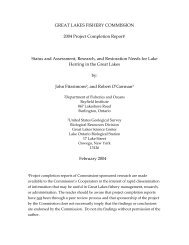- Page 1 and 2: Parasites of Fish from the Great La
- Page 3 and 4: Parasites of Fish from the Great La
- Page 5 and 6: Table of Contents OVERVIEW ........
- Page 7: PREFACE There has been no comprehen
- Page 10 and 11: fish species examined and parasites
- Page 12 and 13: changed, especially some monogenean
- Page 14 and 15: Table 1, continued. Scientific name
- Page 16 and 17: Table 1, continued. Scientific name
- Page 20 and 21: Nematodes Ten species of adult nema
- Page 22 and 23: Fish Families—Parasite Species-Ri
- Page 24 and 25: namaycush, and cyprinids. Of the 41
- Page 26 and 27: suitable host and matures. We are n
- Page 28 and 29: Table 2. Overall number, percentage
- Page 30 and 31: Table 3, continued Myxozoa (Myxospo
- Page 32 and 33: Table 3, continued. Myxobolus neuro
- Page 34 and 35: Table 3, continued. Adult Digenea (
- Page 36 and 37: Table 3, continued. Site of Infecti
- Page 38 and 39: Table 3, continued. Strigeidae Rail
- Page 40 and 41: Table 3, continued. Oncorhynchus ts
- Page 42 and 43: Table 3, continued. Diphyllobothrii
- Page 44 and 45: Table 3, continued. Host: Catostomu
- Page 46 and 47: Table 3, continued. Cystidicolidae
- Page 48 and 49: Table 3, continued. Raphidascaris a
- Page 50 and 51: Table 3, continued. Quimperiidae Ba
- Page 52 and 53: Table 3, continued. Osmerus mordax:
- Page 54 and 55: Table 3, continued. Rhadinorhynchid
- Page 56 and 57: Table 3, continued. Host: Coregonus
- Page 58 and 59: Table 3, continued. Host: Oncorhync
- Page 60 and 61: Table 5. Fishes by family and speci
- Page 62 and 63: Table 5, continued. Ictaluridae Ame
- Page 64 and 65: Table 5, continued. Coregonus spp.
- Page 66 and 67: Table 5, continued. Cottus bairdii
- Page 68 and 69:
Table 5, continued. Hirudinea: Dess
- Page 70 and 71:
Digenetic Trematodes This parasite
- Page 72 and 73:
Fish Species—Parasite Analyses Th
- Page 74 and 75:
The numbers and percentages of auto
- Page 76 and 77:
Cestodes Eubothrium crassum, E. rug
- Page 78 and 79:
Most fish species examined for para
- Page 80 and 81:
Table 8, continued. Ciliophora (Cil
- Page 82 and 83:
Table 8, continued. Myxobolus burti
- Page 84 and 85:
Table 8, continued. Coregonus hoyi:
- Page 86 and 87:
Table 8, continued. Phyllodistomum
- Page 88 and 89:
Table 8, continued. Host: Luxilus c
- Page 90 and 91:
Table 8, continued. Tylodelphys sch
- Page 92 and 93:
Table 8, continued. Urocleidus acul
- Page 94 and 95:
Table 8, continued. Diclybothriidae
- Page 96 and 97:
Table 8, continued. Tetraonchus var
- Page 98 and 99:
Table 8, continued. Host: Catostomu
- Page 100 and 101:
Table 8, continued. Proteocephalus
- Page 102 and 103:
Table 8, continued. Host: Coregonus
- Page 104 and 105:
Table 8, continued. Triaenophorus n
- Page 106 and 107:
Table 8, continued. Truttaedacnitis
- Page 108 and 109:
Table 8, continued. Coregonus arted
- Page 110 and 111:
Table 8, continued. Philonema oncor
- Page 112 and 113:
Table 8, continued. Host Ambloplite
- Page 114 and 115:
Table 8, continued. Coregonus arted
- Page 116 and 117:
Table 8, continued. Neoechinorhynch
- Page 118 and 119:
Table 8, continued. Neoechinorhynch
- Page 120 and 121:
Table 8, continued. Ergasilus cotti
- Page 122 and 123:
Table 8, continued. Salmincola sisc
- Page 124 and 125:
Table 9, continued. Larval/Immature
- Page 126 and 127:
Table 9, continued. Esocidae Esox l
- Page 128 and 129:
Table 9, continued. Coregonus kiyi
- Page 130 and 131:
Table 9, continued. Larval/Immature
- Page 132 and 133:
Table 9, continued. Centrarchidae A
- Page 134 and 135:
Table 10. Numbers and percentages (
- Page 136 and 137:
Fish Species—Parasite Analysis Tw
- Page 138 and 139:
Table 12, continued. Crepidostomum
- Page 140 and 141:
Table 12, continued. Cryptogonimus
- Page 142 and 143:
Table 12, continued. Proteocephalus
- Page 144 and 145:
Table 12, continued. Host: Esox luc
- Page 146 and 147:
Table 12, continued. Spinitectus sp
- Page 148 and 149:
Table 12, continued. Pomphorhynchid
- Page 150 and 151:
Table 13, continued. Catostomidae C
- Page 152 and 153:
Table 13, continued. Lepomis macroc
- Page 154 and 155:
Sixteen species of myxozoans repres
- Page 156 and 157:
Acanthocephalans Sixteen species of
- Page 158 and 159:
The parasite group(s) (in parenthes
- Page 160 and 161:
(2), Ergasilus caeruleus (7), E. lu
- Page 162 and 163:
Nematodes Hysterothylacium brachyur
- Page 164 and 165:
Fish Families—Parasite Communitie
- Page 166 and 167:
Table 14, continued. Host: Luxilus
- Page 168 and 169:
Table 14, continued. Myxobolus burt
- Page 170 and 171:
Table 14, continued. Catostomus com
- Page 172 and 173:
Table 14, continued. Host: Luxilus
- Page 174 and 175:
Table 14, continued. Lepomis gibbos
- Page 176 and 177:
Table 14, continued. Allacanthochas
- Page 178 and 179:
Table 14, continued. Phyllodistomum
- Page 180 and 181:
Table 14, continued. Plagioporus si
- Page 182 and 183:
Table 14, continued. Diplostomidae
- Page 184 and 185:
Table 14, continued. Salvelinus nam
- Page 186 and 187:
Table 14, continued. Sander canaden
- Page 188 and 189:
Table 14, continued. Ambloplites ru
- Page 190 and 191:
Table 14, continued. Culaea inconst
- Page 192 and 193:
Table 14, continued. Ligictaluridus
- Page 194 and 195:
Table 14, continued. Urocleidus ala
- Page 196 and 197:
Table 14, continued. Dactylogyrus d
- Page 198 and 199:
Table 14, continued. Host: Coregonu
- Page 200 and 201:
Table 14, continued. Gyrodactylus g
- Page 202 and 203:
Table 14, continued. Etheostoma nig
- Page 204 and 205:
Table 14, continued. Eubothrium sal
- Page 206 and 207:
Table 14, continued. Cottus bairdii
- Page 208 and 209:
Table 14, continued. Proteocephalus
- Page 210 and 211:
Table 14, continued. Larval/Immatur
- Page 212 and 213:
Table 14, continued. Catostomus cat
- Page 214 and 215:
Table 14, continued. Triaenophorida
- Page 216 and 217:
Table 14, continued. Adult Nematoda
- Page 218 and 219:
Table 14, continued. Capillaria cat
- Page 220 and 221:
Table 14, continued. Oncorhynchus t
- Page 222 and 223:
Table 14, continued. Percopsis omis
- Page 224 and 225:
Table 14, continued. Rhabdochona ca
- Page 226 and 227:
Table 14, continued. Raphidascaris
- Page 228 and 229:
Table 14, continued. Spinitectus gr
- Page 230 and 231:
Table 14, continued. Rhabdochonidae
- Page 232 and 233:
Table 14, continued. Host: Petromyz
- Page 234 and 235:
Table 14, continued. Salvelinus fon
- Page 236 and 237:
Table 14, continued. Pungitius pung
- Page 238 and 239:
Table 14, continued. Neoechinorhync
- Page 240 and 241:
Table 14, continued. Perca flavesce
- Page 242 and 243:
Table 14, continued. Hirudinea (Lee
- Page 244 and 245:
Table 14, continued. Ergasilidae No
- Page 246 and 247:
Table 14, continued. Ergasilus vers
- Page 248 and 249:
Table 14, continued. Salmincola ext
- Page 250 and 251:
Table 15. Fishes by family from Lak
- Page 252 and 253:
Table 15, continued. Cyprinus carpi
- Page 254 and 255:
Table 15, continued. Monogenea: Dac
- Page 256 and 257:
Table 15, continued. Catostomidae C
- Page 258 and 259:
Table 15, continued. Adult Acanthoc
- Page 260 and 261:
Table 15, continued. Immature Acant
- Page 262 and 263:
Table 15, continued. Oncorhynchus m
- Page 264 and 265:
Table 15, continued. Adult Nematoda
- Page 266 and 267:
Table 15, continued. Fundulidae Fun
- Page 268 and 269:
Table 15, continued. Adult Acanthoc
- Page 270 and 271:
Table 15, continued. Lepomis macroc
- Page 272 and 273:
Table 15, continued. Adult Cestoda:
- Page 274 and 275:
Table 15, continued. Gobiidae Apoll
- Page 276 and 277:
Percina caprodes, Sander vitreus, A
- Page 278 and 279:
Table 18, continued. Clinostomidae
- Page 280 and 281:
Table 18, continued. LAKE ST CLAIR
- Page 282 and 283:
Table 18, continued. Strigeidae Rai
- Page 284 and 285:
Table 18, continued. Salvelinus nam
- Page 286 and 287:
Table 18, continued. Spiroxys sp. S
- Page 288 and 289:
Table 18, continued. DETROIT RIVER
- Page 290 and 291:
Table 19, continued. Salmonidae Cor
- Page 292 and 293:
Parasite Species—Overview LAKE ER
- Page 294 and 295:
Cestodes Twenty-four species of adu
- Page 296 and 297:
Parasitological studies have been d
- Page 298 and 299:
N. atherinoides, N. buccatus, N. he
- Page 300 and 301:
mordax in Lake Erie. Mass mortaliti
- Page 302 and 303:
Copepods Copepods (Argulus catostom
- Page 304 and 305:
Table 20. Parasites reported in fis
- Page 306 and 307:
Table 20, continued. Capriniana sp.
- Page 308 and 309:
Table 20, continued. Myxobolus cons
- Page 310 and 311:
Table 20, continued. Sphaerosporida
- Page 312 and 313:
Table 20, continued. Host: Osmerus
- Page 314 and 315:
Table 20, continued. Perca flavesce
- Page 316 and 317:
Table 20, continued. Azygia longa (
- Page 318 and 319:
Table 20, continued. Host: Micropte
- Page 320 and 321:
Table 20, continued. Host: Aplodino
- Page 322 and 323:
Table 20, continued. Microcreadium
- Page 324 and 325:
Table 20, continued. Host: Amia cal
- Page 326 and 327:
Table 20, continued. Unknown Family
- Page 328 and 329:
Table 20, continued. Lepomis gibbos
- Page 330 and 331:
Table 20, continued. Ictalurus punc
- Page 332 and 333:
Table 20, continued. Host: Esox luc
- Page 334 and 335:
Table 20, continued. Etheostoma exi
- Page 336 and 337:
Table 20, continued. Percina copela
- Page 338 and 339:
Table 20, continued. Unknown Family
- Page 340 and 341:
Table 20, continued. Axinidae Unnit
- Page 342 and 343:
Table 20, continued. Dactylogyrus a
- Page 344 and 345:
Table 20, continued. Lyrodiscus sem
- Page 346 and 347:
Table 20, continued. Tetracleidus c
- Page 348 and 349:
Table 20, continued. Gyrodactylidae
- Page 350 and 351:
Table 20, continued. Percina caprod
- Page 352 and 353:
Table 20, continued. Tetraonchidae
- Page 354 and 355:
Table 20, continued. Bothriocephalu
- Page 356 and 357:
Table 20, continued. Proteocephalus
- Page 358 and 359:
Table 20, continued. Proteocephalus
- Page 360 and 361:
Table 20, continued. Amphicotylidae
- Page 362 and 363:
Table 20, continued. Schistocephalu
- Page 364 and 365:
Pomoxis nigromaculatus: Bangham 197
- Page 366 and 367:
Table 20, continued. Triaenophorus
- Page 368 and 369:
Table 20, continued. Cyprinella whi
- Page 370 and 371:
Table 20, continued. Etheostoma ble
- Page 372 and 373:
Table 20, continued. Perca flavesce
- Page 374 and 375:
Table 20, continued. Micropterus do
- Page 376 and 377:
Table 20, continued. Philometra sp.
- Page 378 and 379:
Table 20, continued. Unknown Family
- Page 380 and 381:
Table 20, continued. Dioctophymatid
- Page 382 and 383:
Table 20, continued. Philometridae
- Page 384 and 385:
Table 20, continued. Superfamily Sp
- Page 386 and 387:
Table 20, continued. Neoechinorhync
- Page 388 and 389:
Table 20, continued. Octospinifer m
- Page 390 and 391:
Table 20, continued. Pomoxis annula
- Page 392 and 393:
Table 20, continued. Lepomis gibbos
- Page 394 and 395:
Table 20, continued. Lepomis cyanel
- Page 396 and 397:
Table 20, continued. Sander glaucum
- Page 398 and 399:
Table 20, continued. Lernaea crucia
- Page 400 and 401:
Table 20, continued. Mollusca (Moll
- Page 402 and 403:
Table 21, continued. Adult Cestoda:
- Page 404 and 405:
Table 21, continued. Larval/Immatur
- Page 406 and 407:
Table 21, continued. Notemigonus cr
- Page 408 and 409:
Table 21, continued. Monogenea: Uni
- Page 410 and 411:
Table 21, continued. Adult Acanthoc
- Page 412 and 413:
Table 21, continued. Larval/Immatur
- Page 414 and 415:
Table 21, continued. Larval/Immatur
- Page 416 and 417:
Table 21, continued. Umbridae Umbra
- Page 418 and 419:
Table 21, continued. Gadidae Lota l
- Page 420 and 421:
Table 21, continued. Larval/Immatur
- Page 422 and 423:
Table 21, continued. Larval/Immatur
- Page 424 and 425:
Table 21, continued. Adult Nematoda
- Page 426 and 427:
Table 21, continued. Percidae Ammoc
- Page 428 and 429:
Table 21, continued. Adult Nematoda
- Page 430 and 431:
Table 21, continued. Adult Cestoda:
- Page 432 and 433:
Table 21, continued. Hirudinea: Act
- Page 434 and 435:
Table 23. Jaccard coefficients of p
- Page 436 and 437:
Table 25. Fishes by family from the
- Page 438 and 439:
Aspidobothreans Cotylogaster occide
- Page 440 and 441:
The 49 fish species from Lake Ontar
- Page 442 and 443:
Parasite species or a specific genu
- Page 444 and 445:
Cestodes Several adult cestodes (Eu
- Page 446 and 447:
Parasite Host Specificity—Jaccard
- Page 448 and 449:
Table 26, continued. Host: Anguilla
- Page 450 and 451:
Table 26, continued. Myxobolus bart
- Page 452 and 453:
Table 26, continued. Microspora (Mi
- Page 454 and 455:
Table 26, continued. Crepidostomum
- Page 456 and 457:
Table 26, continued. Cryptogonimida
- Page 458 and 459:
Table 26, continued. Host: Ictaluru
- Page 460 and 461:
Table 26, continued. Cryptogonimida
- Page 462 and 463:
Table 26, continued. Etheostoma exi
- Page 464 and 465:
Table 26, continued. Apophallus ven
- Page 466 and 467:
Table 26, continued. Actinocleidus
- Page 468 and 469:
Table 26, continued. Cleidodiscus s
- Page 470 and 471:
Table 26, continued. Onchocleidus a
- Page 472 and 473:
Table 26, continued. Onchocleidus s
- Page 474 and 475:
Table 26, continued. Urocleidus ads
- Page 476 and 477:
Table 26, continued. Dactylogyrus b
- Page 478 and 479:
Table 26, continued. Gyrodactylidae
- Page 480 and 481:
Table 26, continued. Gyrodactylus p
- Page 482 and 483:
Table 26, continued. Tetraonchidae
- Page 484 and 485:
Table 26, continued. Proteocephalid
- Page 486 and 487:
Table 26, continued. Triaenophorida
- Page 488 and 489:
Table 26, continued. Proteocephalus
- Page 490 and 491:
Table 26, continued. Camallanidae R
- Page 492 and 493:
Table 26, continued. Host: Coregonu
- Page 494 and 495:
Table 26, continued. Rhabdochona sp
- Page 496 and 497:
Table 26, continued. Cystidicolidae
- Page 498 and 499:
Table 26, continued. Echinorhynchus
- Page 500 and 501:
Table 26, continued. Host: Acipense
- Page 502 and 503:
Table 26, continued. Hirudinea (Lee
- Page 504 and 505:
Table 26, continued. Perca flavesce
- Page 506 and 507:
Table 26, continued. Salmincola ext
- Page 508 and 509:
Table 27. Fishes by family from Lak
- Page 510 and 511:
Table 27, continued. Monogenea: Dac
- Page 512 and 513:
Table 27, continued. Catostomidae C
- Page 514 and 515:
Table 27, continued. Esocidae Esox
- Page 516 and 517:
Table 27, continued. Coregonus hoyi
- Page 518 and 519:
Table 27, continued. Gasterosteidae
- Page 520 and 521:
Table 27, continued. Centrarchidae
- Page 522 and 523:
Table 27, continued. Larval/Immatur
- Page 524 and 525:
Table 27, continued. Etheostoma nig
- Page 526 and 527:
Table 27, continued. Sciaenidae Apl
- Page 528 and 529:
species), Neoechinorhynchus crassus
- Page 530 and 531:
commonly found unencysted and coile
- Page 532 and 533:
Exotic Parasite Species Mills et al
- Page 534 and 535:
that have direct life cycles. Cesto
- Page 536 and 537:
Table 30. Jaccard coefficients of p
- Page 538 and 539:
Ambloplites rupestris harbored as f
- Page 540 and 541:
in composition and numbers between
- Page 542 and 543:
In Lake Michigan, percids harbored
- Page 544 and 545:
prevalence of cestodes (tapeworms)
- Page 546 and 547:
Anderson, R.C. 1992. Nematode paras
- Page 548 and 549:
Bush, A.O., Fernandez, J.C., Esch,
- Page 550 and 551:
Dechtiar, A.O. 1967b. Neodiscocotyl
- Page 552 and 553:
Esch, G.W., Kennedy, C.R., Bush, A.
- Page 554 and 555:
Hines, R.S. and Spira, D.T. 1974. I
- Page 556 and 557:
Kennedy, C.R. 2009. The ecology of
- Page 558 and 559:
Marcogliese, D.J. 2008. First repor
- Page 560 and 561:
Muzzall, P.M., and Haas, R.C. 1998.
- Page 562 and 563:
Pronin, N.M., Fleischer, G.W., Bald
- Page 564 and 565:
Smith, H.D., and Margolis, L. 1970.
- Page 566 and 567:
Thomas, L.J. 1947. The life cycle o
- Page 568:
Wisniewski, W.L. 1958. Characteriza



